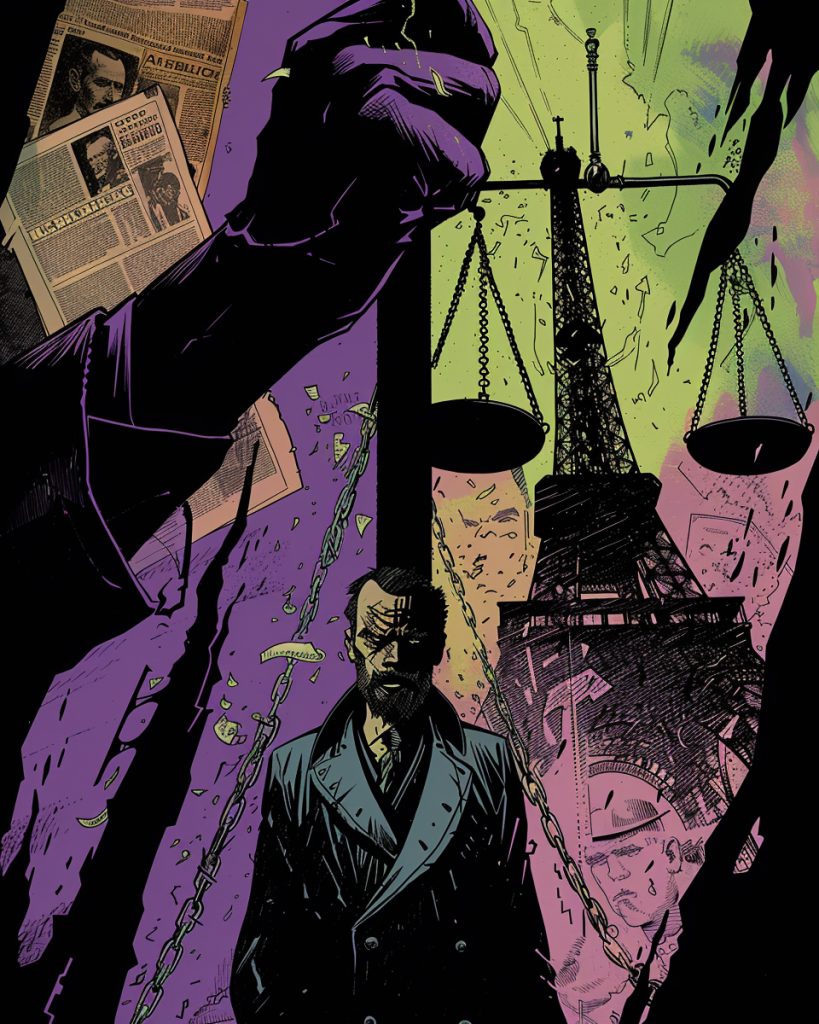The Dreyfus Affair, a scandal that gripped France from 1894 to 1906, exposed deep-rooted antisemitism and threatened to tear the nation apart.
It began with the wrongful conviction of Captain Alfred Dreyfus, a Jewish artillery officer, for allegedly selling military secrets to Germany.
The case revealed the extent of prejudice within the French Army and society, sparking a fierce debate about justice, nationalism, and religious discrimination.
As the affair unfolded, it drew in key figures like Émile Zola, whose impassioned open letter “J’accuse…!” rocked the establishment.
The real culprit, Major Ferdinand Walsin Esterhazy, was eventually identified but initially protected by the military hierarchy.
Lieutenant Colonel Georges Picquart, who uncovered evidence of Dreyfus’s innocence, found himself sidelined and persecuted for his efforts to reveal the truth.
The saga took unexpected turns, with Dreyfus sentenced to life imprisonment on Devil’s Island, a penal colony in French Guiana.
His eventual exoneration in 1906 came after years of public controversy, legal battles, and political maneuvering.
The Dreyfus Affair left an indelible mark on French society, challenging long-held beliefs and institutions, and setting the stage for social reforms in the early 20th century.
The Spark of Controversy
The Dreyfus Affair ignited in 1894, sending shockwaves through French society. It began with accusations of treason against a Jewish artillery officer, setting the stage for a scandal that would expose deep-rooted antisemitism and divide the nation for over a decade.
1894: The Infamous Court-Martial of Alfred Dreyfus
In December 1894, Captain Alfred Dreyfus found himself at the center of a political storm that would rock France to its core.
The 35-year-old Alsatian officer of Jewish descent faced a military tribunal, accused of a crime that would tarnish his name and shake the foundations of the Third French Republic.
The court-martial, shrouded in secrecy, swiftly found Dreyfus guilty of treason. His sentence? Deportation to the penal colony in French Guiana and life imprisonment.
The verdict sent ripples through French society, exposing underlying tensions and prejudices.
Treason and the German Embassy: The Accusations
At the heart of the controversy lay a document that would change the course of French history. A cleaning lady working at the German Embassy in Paris had discovered a torn letter in a wastepaper basket.
This seemingly innocuous find would become the linchpin of the prosecution’s case against Dreyfus.
The letter, known as the bordereau, suggested that French military secrets were being passed to the Germans. Handwriting experts, under pressure from military authorities, claimed the writing matched Dreyfus’s.
Despite flimsy evidence, the accusation of communicating French military secrets to the German Empire stuck.
Dreyfus vehemently denied the charges, but his protests fell on deaf ears. The specter of antisemitism loomed large, influencing public opinion and the military’s rush to judgment.
Echoes of Injustice
The Dreyfus Affair reverberated through French society, exposing deep-seated prejudices and challenging the nation’s ideals of justice and equality. Its impact stretched far beyond the courtroom, affecting families and fueling a widespread debate on antisemitism.
The Dreyfus Family and the Weight of Conviction
Alfred Dreyfus’s wrongful conviction in 1894 cast a long shadow over his family.
His wife Lucie became a tireless advocate for his innocence, writing letters and petitioning officials. Their children grew up under the stigma of their father’s alleged treason.
The Dreyfus clan rallied around Alfred, with his brother Mathieu leading efforts to clear his name. This family unity stood in stark contrast to the divided nation.
As Alfred languished on Devil’s Island, his relatives faced social ostracism and threats.
Their unwavering belief in his innocence eventually bore fruit. The family’s persistence helped bring about Alfred’s retrial and ultimate exoneration in 1906, though the scars of injustice lingered long after.

Antisemitism in France: A National Malaise
The Dreyfus Affair laid bare the deep-rooted antisemitism that plagued French society.
Dreyfus’s Jewish heritage became a focal point for those who sought to portray him as inherently disloyal to France.
Antisemitic publications like La Libre Parole fanned the flames of prejudice, portraying Jews as a threat to national security. Street demonstrations often took on an anti-Jewish tone, revealing the extent of popular antisemitism.
The affair galvanized both antisemitic forces and those who fought against such bigotry. It sparked a national debate on the place of Jews in French society and the dangers of unchecked prejudice.
Counterpoints and Revelation
The Dreyfus Affair took unexpected turns as new evidence emerged and key figures challenged the original narrative.
Esterhazy and Picquart: Twists in the Narrative
Major Ferdinand Walsin Esterhazy emerged as a central figure in the Dreyfus case.
In 1896, Lieutenant Colonel Georges Picquart, head of French military intelligence, uncovered evidence implicating Esterhazy in the crime for which Dreyfus had been convicted.
Picquart’s discovery set off a chain of events that would ultimately lead to the case’s reopening. However, his superiors initially suppressed this information, transferring him to Tunisia to keep him quiet.
Esterhazy’s involvement raised questions about the original investigation’s thoroughness and integrity. It highlighted the possibility that anti-Semitism had played a role in Dreyfus’s conviction.
1896: Unraveling Military Secrets
The year 1896 marked a turning point in the Dreyfus Affair. New evidence came to light, casting doubt on the original verdict.
A document known as the “petit bleu” was intercepted, revealing communication between the German military attaché and Esterhazy.
This discovery prompted a re-examination of the bordereau, the document that had led to Dreyfus’s conviction. Handwriting experts now suggested that Esterhazy, not Dreyfus, was the author.
These revelations exposed flaws in the military’s handling of sensitive information and raised concerns about the reliability of its intelligence-gathering methods. Unravelling these secrets would ultimately force a reassessment of the entire case.
Emile Zola and the Winds of Change
Emile Zola, a prominent French writer, played a pivotal role in turning public opinion.
In 1898, he published “J’Accuse…!”, an open letter to the French president, in the newspaper L’Aurore.
Zola’s impassioned plea:
- Exposed the military’s cover-up
- Accused high-ranking officials of obstruction of justice
- Called for a fair trial for Dreyfus
This bold move reignited public interest in the case and sparked intense debate across France. Zola’s intervention transformed the Dreyfus Affair from a military matter into a national crisis, forcing the government to confront the issues of anti-Semitism and judicial misconduct.
The Tides of Public Opinion
Public sentiment around the Dreyfus Affair underwent dramatic shifts as new evidence emerged and influential voices spoke out. These changes reflected deeper tensions in French society and had far-reaching consequences.
1899: A Reformed Court-Martial?
The Court of Cassation’s decision to review Dreyfus’s case sparked hope among his supporters.
A new trial in Rennes seemed to promise a fair hearing at last.
Yet the proceedings revealed deep-rooted prejudices. Military witnesses clung to flimsy evidence.
The court’s eventual verdict – guilty, with “extenuating circumstances” – left both sides unsatisfied.
Public reaction was mixed. Some saw the reduced sentence as progress, while others viewed it as a hollow compromise. The affair continued to expose fault lines in French society, pitting traditionalists against reformers.
Legacy and Liberation
The Dreyfus Affair left an indelible mark on French society, reshaping political landscapes and challenging deep-rooted prejudices. Its resolution brought both triumph and introspection, forcing a nation to confront its biases and redefine its values.
1906: The Climactic Exoneration
On July 12, 1906, the French Supreme Court delivered a landmark decision that would reverberate through history.
Alfred Dreyfus, the Jewish artillery officer wrongfully convicted of treason, was finally exonerated. This verdict marked the culmination of a 12-year struggle for justice that had divided France.
The court’s decision was unequivocal, declaring Dreyfus innocent of all charges.
In a poignant ceremony, Dreyfus was reinstated to the French Army with the rank of major. He received the Legion of Honor, France’s highest order of merit, symbolizing the nation’s attempt to right a grave injustice.

The Aftermath: Repercussions for the French Military and Beyond
The Dreyfus Affair triggered a seismic shift in French society.
The military, once revered as the guardian of national honor, faced intense scrutiny and reform.
High-ranking officers implicated in the cover-up were dismissed or resigned, leading to a restructuring of military leadership.
The affair catalyzed the separation of church and state in France. This weakened the influence of the Catholic Church, which had largely sided against Dreyfus.
It also galvanized the Zionist movement, inspiring Theodor Herzl to advocate for a Jewish homeland.
Politically, the affair strengthened France’s left-wing parties and secularists.
It exposed the depths of antisemitism in French society, sparking debates on prejudice and national identity that continue to resonate today.

